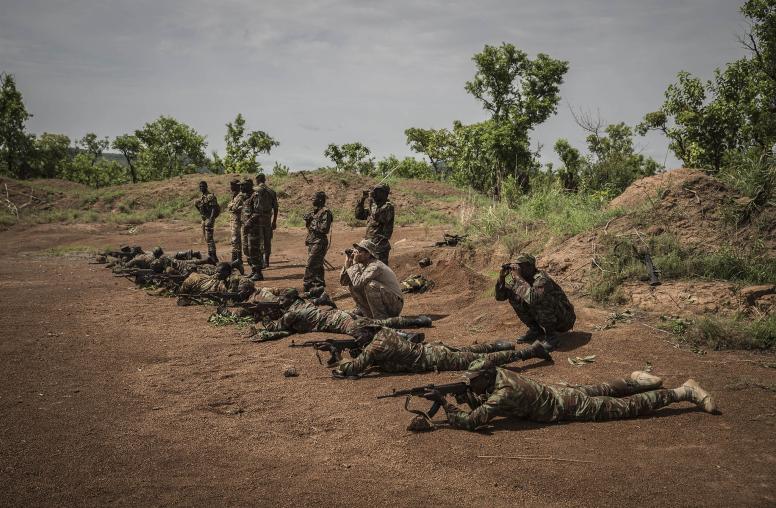Research & Analysis
U.S. Institute of Peace’s articles, reports, tools and other features provide policy analysis, research findings, and practitioner guides. These publications examine critical conflict issues at the center of the Institute’s work to prevent and resolve violent conflict.
The views expressed in these publications are those of the author(s).
The Current Situation in China
The Institute’s work on China has two primary objectives: preventing violent conflict between the United States and China and countering China’s destabilizing behavior and malign influence in other countries that could potentially draw the United States into a costly war.

The Current Situation in Iraq
Iraq continues to recover from cycles of conflict that have displaced millions of people and caused widespread destruction. As the country rebuilds domestically and reintegrates into the region and the international community, it also needs to improve governance, diversify its economy and address water insecurity, among other challenges. Iraq also continues to grapple with the lasting human legacies of ISIS, including the reintegration of returnees from al-Hol camp in Northeast Syria and internally displaced persons.

The Current Situation in Burma
Following 10 years of gradual progress on political and economic liberalization—and a landslide victory for the NLD in the 2020 election—the Burmese army took power in a coup on February 1, 2021, just hours before the newly elected members of Parliament were set to convene. The army has quickly reversed hard-won progress toward democracy and human rights in Burma. It has arrested elected officials, activists, and journalists, done away with even the most basic civil and political rights, blocked access to social media, and, intermittently, to the internet entirely.

The Current Situation: Israel, The Palestinian Territories, Egypt and the Levant
For over seven decades, the Israeli-Palestinian conflict — and its broader regional reverberations — has shaped Middle East politics and impacted U.S. interests in the region. Hamas’ unprecedented terror attack on October 7, 2023, the Israeli military response in Gaza and the implications for neighboring Jordan and Egypt — as well as seismic ripples in Lebanon and Syria — have sparked a new phase in the conflict’s and the region’s trajectory.

A Wake-up Call for West Africa: Addressing the Region’s Rising Violent Extremism
On January 8, the al-Qaida affiliated group Jama'at Nusrat al-Islam wal-Muslimin (JNIM) launched a meticulously planned assault on a fortified military post in northern Benin’s Alibori region, near the country’s borders with Burkina Faso and Niger. The attack claimed the lives of 28 soldiers, injured dozens more and sent shockwaves through a region long considered a fragile but reliable buffer against the violence of the nearby Sahel.

What the Houthis’ Foreign Terrorist Designation Could Mean for Yemen
The Trump administration has begun the process of redesignating Yemen’s Houthis as a foreign terrorist organization (FTO) over the groups’ firing at U.S. warships; violently overthrowing Yemen’s internationally recognized government; launching attacks against civilian infrastructure in Yemen, Saudi Arabia, the UAE and recently Israel; and attacking commercial shipping. After Hamas’s October 7 terrorist attack, the Houthis fired missiles and drones at Israel and significantly disrupted commercial shipping by attacking ships in the Red Sea. Also known as Ansar Allah, the Iran-backed group says these attacks are done in solidarity with Hamas. They have held fire since the Gaza truce took hold on January 19.

A DRC-Rwanda Truce is Key for African and U.S. Interests — Here’s How to Get There
On January 27, Rwandan-backed rebels known as M23 captured Goma, the largest city in eastern Democratic Republic of Congo (DRC), despite the presence of U.N. peacekeeping force, defense forces from other African countries, local militias, and European mercenaries hired to block its advance. Nearly 3,000 people were killed in M23’s advance into Goma, including the provincial military governor. Roughly 500,000 people fled their homes, adding to the more than two million people displaced by the long-standing conflict.

In Nigeria’s Plateau State, Communal Violence Requires a Locally Led Solution
Starting in late December 2023, vicious and indiscriminate violence broke out in the Mangu local government area in Plateau State, Nigeria among the area’s farming and pastoral communities. By the time the attacks stopped in mid-February 2024, reports indicated that 865 people, including 160 children, had been brutally killed.

Andrew Scobell on China’s Approach to Conflict
As the U.S. prepares for “continued stormy weather” in its relations with China, it’s important to remember that while Beijing’s escalatory actions remain below the threshold of outright conflict, Chinese leaders “think about war and peace as being on a continuum,” says USIP’s Andrew Scobell.

Netanyahu Comes to U.S. Amid Potential Inflection Point in the Middle East
On Tuesday, Israeli Prime Minister Benjamin Netanyahu becomes the first foreign leader to meet with President Donald Trump since his return to the White House. The visit comes as a fragile but holding cease-fire in Gaza approaches the midway point of its initial six-week phase, and as phase two of the agreement’s prescribed negotiations begin, with critical questions surrounding Gaza’s transitional security and governance to be decided. It also comes against a backdrop of a recently extended cease-fire deal between Israel and Hezbollah, expressed interest by both Trump and Netanyahu in advancing Israeli-Saudi normalization, and international concern over Iran’s nuclear threshold, despite the setbacks dealt to the “Axis of Resistance.”